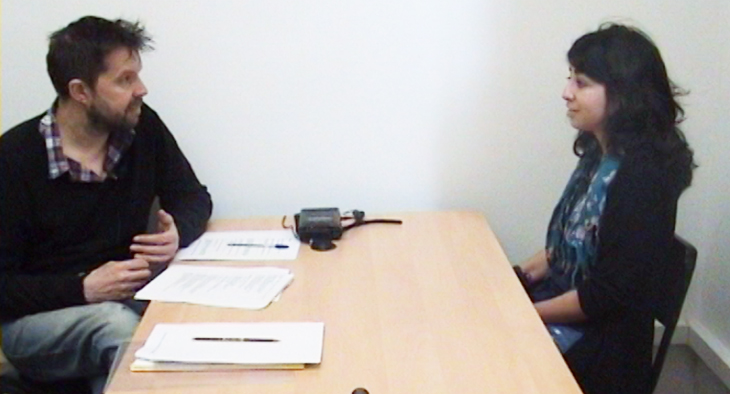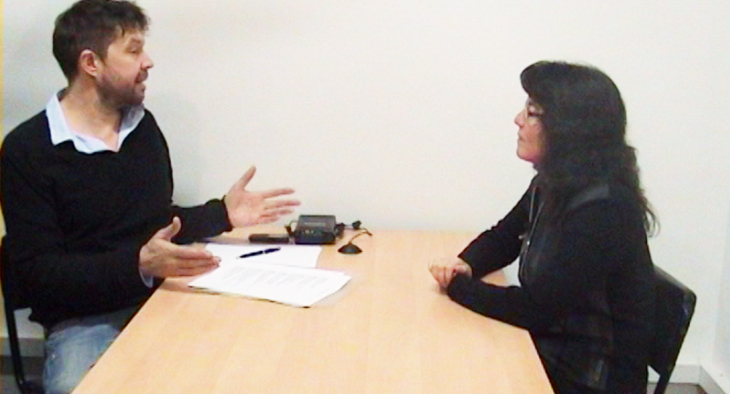
In this unit you will focus on the following:
- An overview of Part 2 of the speaking test
- The examiner's instructions
- Understanding the question
- The examiner's follow-up questions
- Making notes
- Structuring your answer (1)
- Expanding on ideas
- Describing possessions
1. An overview of Part 2 of the speaking test.

Are the statements about Part 2 of the test (the long turn) true or false?
2. The examiner's instructions.
Watch the extract of the examiner giving instructions for Part 2 of the speaking test and choose the correct options to complete the information.
3. The examiner's instructions.
Use the words to complete the examiner's instructions, then watch the extract again to check your answers.
4. Understanding the question.

Read the three tasks below carefully. Then watch the video of Part 2 of the test. Which task is the candidate talking about?
| 1. | Describe the way you use computers. | |
| You should say: | what you use them for | |
| what you would do without them | ||
| how long you have been using computers | ||
| 2. | Describe the different things people use computers for. | ||
| You should say: | why people use them | ||
| why they are important | |||
| what you use computers for | |||
| 3. | Describe a piece of equipment that you often use at home or at work. | ||
| You should say: | what you use it for | ||
| what features it has | |||
| how important it is to you | |||
5. Examiner's observations.
Which comments best describe Teresa's response to the question?
Now watch the complete extract from Part 2 of the speaking test.
6. The examiner's follow-up questions.
During Part 2 of the speaking test, the examiner may ask you two follow-up questions on the topic you have been given. Listen and type in the missing words to complete the examples of follow-up questions.
7. Deciding what information to include.
Look at these topic points.
| Describe a possession you couldn't live without. | |
| You should say: | what you use it for |
| why it is important to you | |
| where you got it from | |
TIP:
Don't spend too long thinking about which possession you want to talk about. It's important to decide quickly and spend time thinking about what you use it for, why it's important to you, and where you got it from.Which pieces of information could you include in your answer to the question above?
8. Making notes.
TIP:
It's important to make useful notes in your preparation time. This will help you to organise your thoughts and to keep talking during this part of the test. There are different ways of making notes; choose the method you like best.Look at the notes different students have made for the topic in the previous exercise. Choose the comment that best describes the notes.
9. Structuring your answer.
TIP:
It's important to structure your answer logically. There are several ways you can do this, and you will probably use a combination of structures in your answer.Match the examples to the different types of structure.
10. Expanding on your ideas.
TIP:
Giving examples and justifying your opinions will help you to keep talking for the required time in each part of the test and will impress the examiner.Choose the initial statement that the examples follow.
11. Expanding on your ideas.
TIP:
A useful strategy for extending your talk is to mention the past, present and future. This will give you more to talk about and will also show the examiner that you can use different grammatical structures. For example:(Past) I didn’t have a mobile until I was 15. All my friends had one, so I was very envious of them.
(Present) Now, of course my mobile is important for me because I use it for so many things, like …
(Future) A lot of people change their mobiles frequently, but I won’t change mine until I really need to. … etc.
Read expanded answers from the previous exercise. What function do the phrases in bold have? Put the phrases below the text into the correct category.
I couldn't live without the computer because I need it for work, and if I don't have a computer I cannot do anything. I mean, I use it for writing reports, sending emails to clients and other people in the company, organising my diary – virtually everything, really. I remember one day at work when the email system wasn't working; it was a complete disaster – nobody could do anything!
And then I use it at home, too. I mean, writing emails is a lot easier than writing letters, and it's much quicker, too. I can email some friends in the morning to organise to meet up in the afternoon. I guess I could call, but when it's a group of people, email is much easier.
I use it to get information, too, about – I don't know, virtually everything. Like if I want to cook something special I can get the recipe on the Internet, or even a video that shows me how to do it. It's so much easier than looking in a book, and of course with a book you'd need to go to a shop or the library or whatever, but I have a computer right in my house.
Do I think people rely too much on computers? I think so. I think so, now, yes. I mean, as I was saying, I couldn't do anything without mine, and I think a lot of people are the same.
12. I mean.
I mean is one of the most common phrases in spoken English. It is used to introduce an explanation.
Choose the correct option to introduce the explanations.
13. Describing possessions.
Put the phrases in the gaps to complete the first two descriptions.
Now complete the next two descriptions.
14. Task.
Now practise your answer to the Part 2 task:
| Describe a possession you couldn't live without. | |
| You should say: | what you use it for |
| why it is important to you | |
| where you got it from | |
and explain why you couldn’t live without it.
Rounding-off questions
- Is it valuable in terms of money?
- Would it be easy to replace?
Time yourself so that you get used to speaking for two minutes without support.
Remember to:
- use your preparation time carefully and make appropriate and useful notes.
- expand on your answers using examples and justifications.
- use strategies to make your hesitation sound natural.